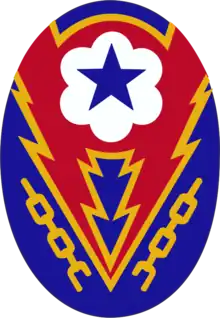ADSEC
ADSEC was the Advance Section of the Communications Zone (Com-Z), European Theater of Operations, United States Army (ETOUSA), and was formally activated at Bristol, England in February 1944. It is commonly referred to as simply "ADSEC". Upon its creation, ADSEC was attached to the U.S. First Army, but from the outset was one section (of ten) of the Communications Zone (Com-Z, ETO) logistics organization, and was the first Army logistical agency on the continent. The section moved forward with the Armies and provided close support. ADSEC came into actual operation on 6 June 1944 with the invasion of Normandy, D-Day, and was operating on both U.S. beaches as soon as they were secure.
| Advanced Section Communications Zone European Theater of Operations, U.S. Army | |
|---|---|
 Com-Z patch. The meaning of the patch is the lightning bolt represents the Allies breaking the chains of Nazi oppression. The patch is similar to the ETOUSA patch with the addition of the blue 5 pointed star in the white six lobed field. This blue star in white field is the emblem of the Services of Supply organization. The ADvance SECtion of the Com-Z, 1/10th of the organization, advanced closely behind the US Armies. There is an arched ADSEC tab that soldiers in ADSEC could wear above this patch. | |
| Active | 1944 to 1945 |
| Country | United States of America |
| Allegiance | United States of America |
| Branch | Army |
| Role | Services of Supply |
| Part of | European Theater of Operations, U.S. Army (ETOUSA) |
| Engagements | Normandy |
| Commanders | |
| Notable commanders | Brig. Gen. Ewart G. Plank, Lt. Gen. John C. H. Lee |
As such, ADSEC did not have a "base" of operations because this support organization was designed to be on the move continuously. For example, major operations always had a designated "D" day or start date for operations. ADSEC units were moved into operating areas on or several days after a particular "D" day. They stayed until about D+40, at which time FECOMZ (Forward Echelon, Communications Zone) units would take over. ADSEC units then moved forward to the next "D" location.
After the 6 June 1944 invasion ADSEC was detached from the U.S. First Army and took control of activities on Omaha Beach, prior to the capture of the port of Cherbourg Harbour on 27 June, with engineering activities that included managing the beaches and building artificial ports, and Com-Z sections taking over command of the areas left behind as the First Army moved forward. Eventually the Com-Z and ADSEC were supporting all three northwest Europe U.S. combat armies, 1st, 3rd, & 9th, moving across France, and into Belgium, Holland and Germany. (Also, the Com-Z had split in two in the fall of 1942 to support the Operation Torch invasion of North Africa, then Sicily, Italy, and southern France, continuing with its Delta Base Section feeding the ADSEC-similar Continental Advance Section (CONAD) that followed the U.S. 7th and French 1st Armies coming at Germany from the south.) Besides staging supplies for the advancing armies to be sustained by ADSEC, the Com-Z also rehabilitated railway rolling stock, restoring rail operations to ever-more forward bases, and provided transportation of food, ordnance, and POL (Petroleum, Oil and Lubricants) using motor operations (see Red Ball Express).
ADSEC units included field hospitals that lay near the rear areas of the advancing Armies. The Com-Z also operated blood banks to store large quantities under refrigerated conditions for use at front line ADSEC hospitals. This system of location of storage depots was flexible, so that in advance of a major military operation blood would be stored where needed, close to front line, but when the engagement was over then blood would be transported back to hospitals and other bases, or wherever it was needed.
ADSEC also included Finance disbursement units. These units were employed to compute payrolls, travel vouchers, etc. and prepare disbursements and collections of currency, though combat soldiers usually banked their pay until on R & R.
ADSEC coordinated disbursement of ordnance and munitions to keep the front lines supplied.
Com-Z officials were responsible for overseeing Red Ball Express trucking within the Com-Z Transportation Section that brought materiel to ADSEC to distribute it.
ADSEC units had to anticipate the needs of the advancing armies and provide as close support as possible as the situations demanded. These units also provided heavy maintenance work for the advancing armies within the Com-Z Ordnance Section.
AT the end of hostilities, ADSEC was close at hand in central and eastern Germany, and sustained the Allied armies as they settled in for occupation duty. They also were distributing food and fuel to aid the millions of refugees moving about a wrecked continent, trying to get to whatever home they could, find loved-ones, and rebuild their ruined nations. After victory on 8 May 1945, all Communication Zone units, including the Advance Section, were rebranded as Theater Service Forces, European Theater (TSF/ET) as they were no longer supporting combat operations.